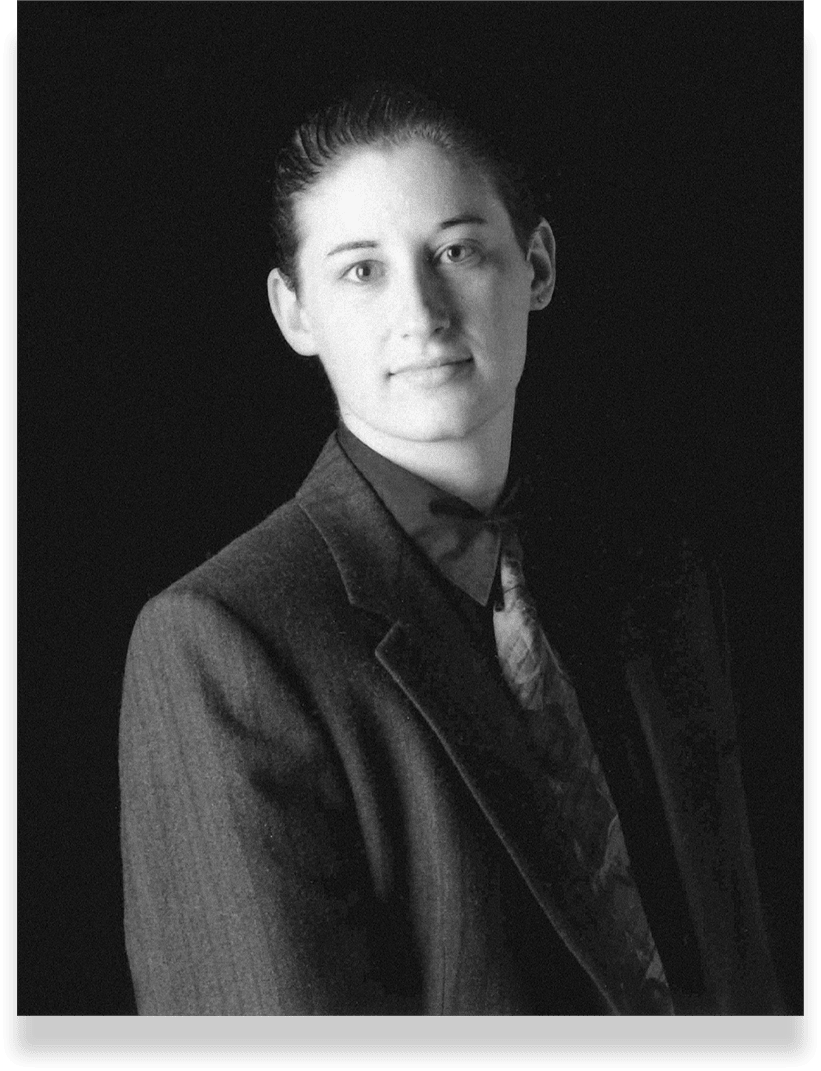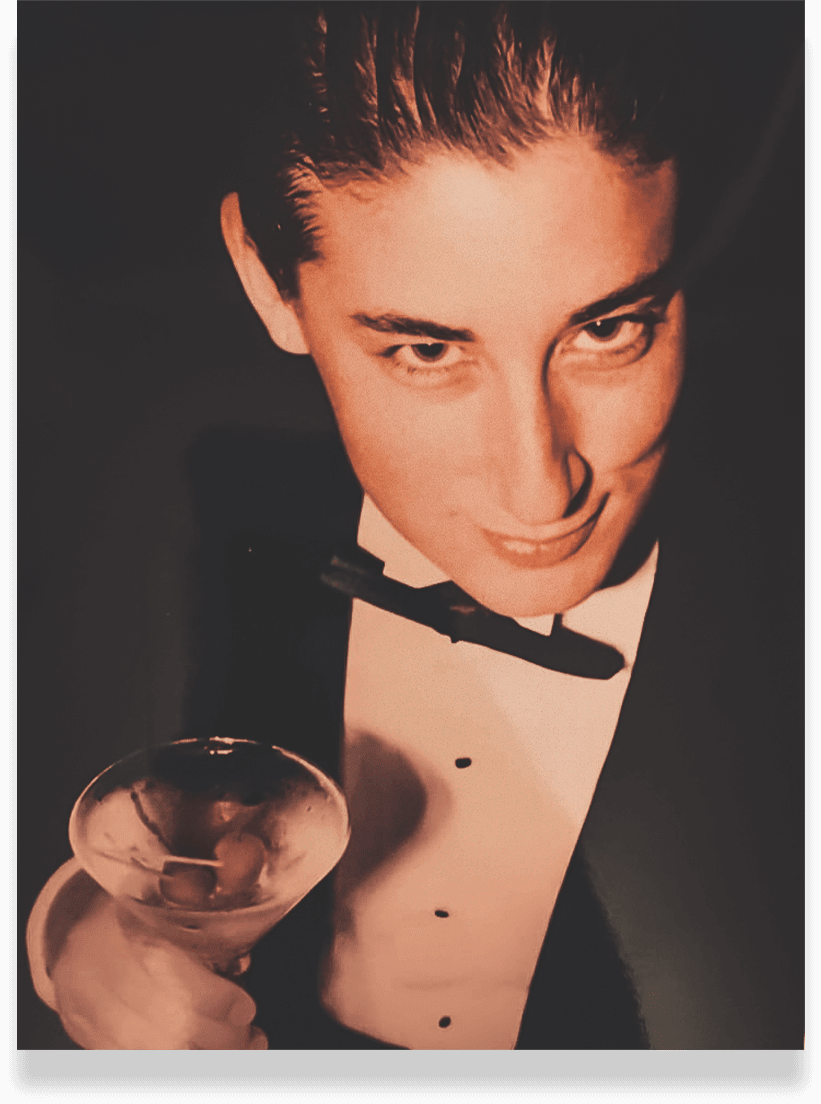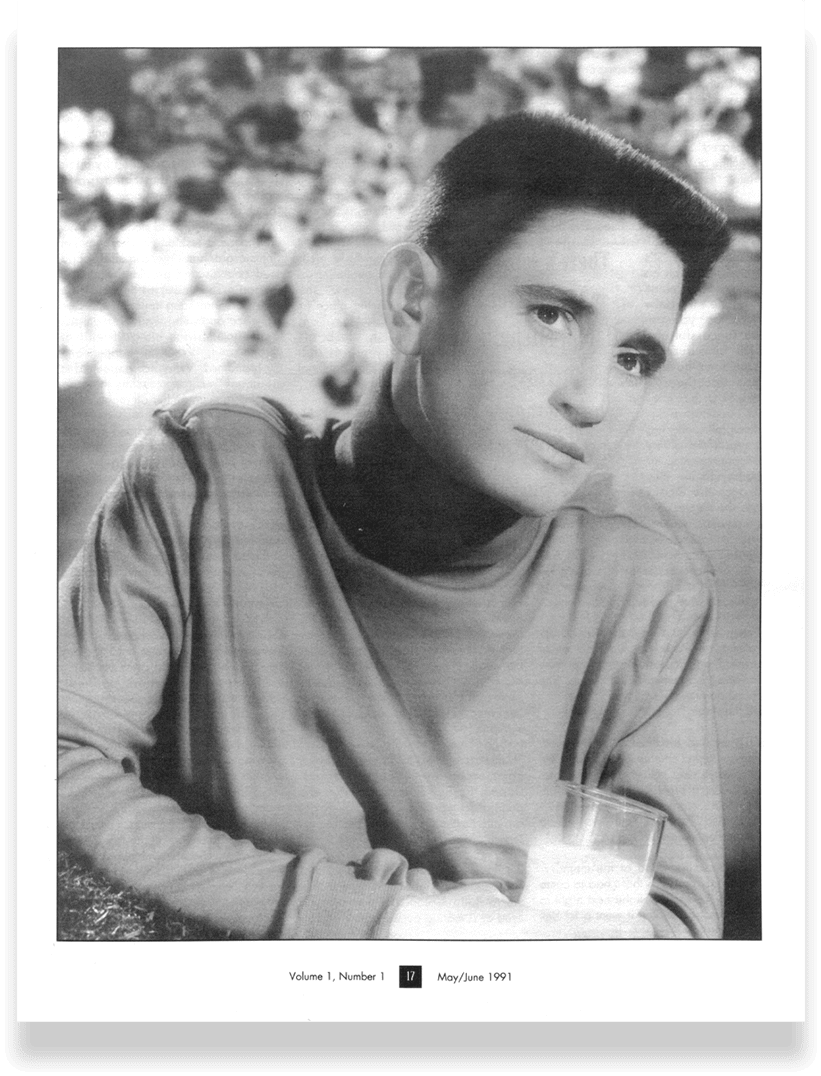Curve Archive and Outreach Manager Julia Rosenzweig taps into the butch origins of the magazine’s
founder and publisher, Franco Stevens.
From Stonewall activist Stormé DeLarverie to renowned author Leslie Feinberg, butch women have been influencing American lesbian culture since before the genesis of the contemporary Western identity that emerged in the 1940s-1950s. It became a formal identity within the underground lesbian bars of the time, where butch/femme dynamics simultaneously reflected and subverted mainstream gender norms.
Curve magazine has maintained a legacy of covering our butch sisters since the very beginning. The first issue of Deneuve (Curve’s precursor) includes an interview with famed Jewish, butch, lesbian folksinger, Phranc. Phranc wears her butchness proudly, with a flat top hairdo, and lyrics that mirror her ethos of being unapologetically herself. Phranc is a throughline in the magazine, appearing many other times throughout the years; sometimes to promote her work, sometimes to speak with other butch artists. She continues to perform, make art, and flaunt that iconic hairstyle to this day. Most recently, the Craig Krull Gallery in Santa Monica, CA presented Phranc: The Butch Closet, the artist’s first career retrospective.
To learn more about what kept the Curve magazine staff coming back to Phranc time and again, I interviewed founder Franco Stevens:
Julia
Today I’d like to ask you about the impact of self-proclaimed “all-American Jewish, lesbian folk singer and artist” Phranc, as well as butch identity. Let’s start of with contextualizing butch identity in the 1990’s, when you started Curve magazine. How do you think the butch identity manifested in the 1990’s and 2000’s?

Franco Stevens
Franco
First off, I love this question because I felt like back when the magazine was started, if you weren’t butch representing then you weren’t seen as an actual 100% lesbian. And part of why I started the magazine was because I was wanting to validate lesbians that looked like everyone across our spectrum…some are femme some are butch, some are in between, some are gender nonconforming. But it was that butch stereotype that was the one that was recognized.
I remember I was at a party at a friend’s house. There were maybe like 60 people there and my friend wasn’t out to her mom and dad, and her mom and dad were there. And when everybody left, her mom said, “Oh, I think I saw a lesbian.” And she was making reference to one very butch dyke who was inside chatting to the parents. I mean, we were all queers. All of us! And that was the only one she recognized.
Julia
There’s an interview with Phranc in the very first issue of Deneuve in 1991 (precursor to Curve). Can you tell me what about her you found so interesting?
Franco
Part of why she’s in that issue is because she was so groundbreaking at the time. She represented women’s music, which, you know, really should have been called “lesbian music” at the time because it’s really the audience that it attracted. She was very out and unapologetic about who she was, the clothes she liked to wear, and what she felt comfortable doing with her body and her hair and her clothing. It gave license for those who wanted to be out and proud to do that.
The other thing is when we were a fledgling magazine. Getting people to talk to us, especially for the first issues, was really tough and we had connections to her. So I don’t really remember exactly how that came about… Do you know who wrote the article? Was it Val Phoenix? Yeah, okay. So, Val must have brought Phranc in.
Julia
When did Phranc first appear on your radar?
Franco
I think Phranc first appeared on my radar when I was working at A Different Light Bookstore in the late 80s, early 90s, before the magazine started. I don’t know if there was a flier hanging in the bookstore or people were just talking about her. But that was kind of like my first introduction to her.
Julia
You revisit Phranc in Deneuve and Curve a few more times, such as in September 1997 where she chats with fellow lesbian musician Gretchen Phillips. As a publisher, what kept you coming back to Phranc and her work?
Franco
I think what kept me coming, what kept the magazine coming back to Phranc was her visibility and her relevance in the community. She was nonstop. I don’t know if she was really touring as much as I thought she was, but it seemed like we would constantly be hearing about Phranc.
I don’t know if she made it into the film, the Ahead of the Curve film but there’s video that we recorded in the 90s… Phranc at an event selling records and she’s very busy and I approach her and I say “Hey, what’s going on,” you know, “Hi, who are you?” or something like that and she goes, “Hi, it’s me, Phranc, “Ph” with a hard “C” and I’m a Jewish dyke and I’m selling my albums” and then she goes back to dishing out the cash, she was super cute.
Julia
How do you think her visibility as a butch lesbian impacted the community and continues to?
Franco
Do you have any other musings on Phranc with a “Ph”? Or butch identity in and of itself?
Well, we could get into a whole topic about, “the last remaining butch.” It just seems like as people become more comfortable with identifying themselves in different ways, that the term butch might be a thing of the past. I mean, to me, neither butch nor dyke are anything but positive references. And in a lot of cases, even within our community, they can be offensive. I don’t understand how anything anybody chooses to identify themselves as should be deemed offensive. I do understand that anything can be a slur if used to hurt or insult someone, even the terms we use to define ourselves.

Photo By Debra St John
Franco
Wow, that’s a hard topic to unpack in such a short amount of time. I love my butch sisters and I want them to feel visible and safe with dressing or presenting as butch. It can be dangerous. When I was a baby butch walking down the street with my (femme) girlfriend, it was always me. I was the one who got verbally abused. The threat of harm was for me because I was clearly, you know, “negatively impacting the other person I was with” to, you know, “bring them to the dark side” because they weren’t as identifiable as queer.
I identify with being butch. I also identify with soft butch and masc. I feel most comfortable wearing comfy casual clothes and dress suits. That’s just me. I can imagine that other people look at me and don’t think I’m very butch, but it’s definitely a part of me that I embrace. It doesn’t actually matter what I wear. I vividly remember when I was on the Geraldo show in the 90s wearing an Anne Klein (women’s) suit and donning lipstick and eyeshadow applied by the show’s makeup artist. Someone in the audience still asked me why I was wearing a “man’s suit.”
The comfort found in donning cozy, casual attire or the empowering allure of a well-fitted dress suit isn’t just about fashion — it’s an expression of my inner truth.
Short hair feels natural to me. I’ve tried to grow out my hair several times and it feels so strange. I love the feeling of a fresh fade. Going to the barbershop and hearing the clippers bring back my butchness is so reaffirming.
